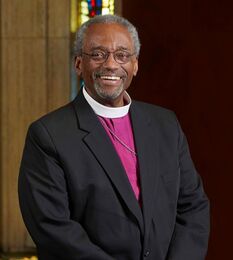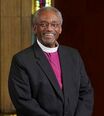 March 30, 2022 “We are here in a world struggling to find its soul, but the light shines in the darkness, and the darkness has not, cannot, and will not overcome it,” Episcopal Church Presiding Bishop and Primate Michael B. Curry said in his Easter 2023 message. “Jesus lives. He has been raised from the dead. That is the message of Easter, and that is the good news of great tidings.” The festive day of Easter is Sunday, April 9. The following is the full text of the presiding bishop’s Easter 2023 message, lightly edited for clarity: This is a different Easter message. I’ve shared Easter messages from Jerusalem some years ago, and I have shared Easter and Christmas messages from a variety of locations. Last year for Christmas, we were in San Diego. Today I’m in Paris, part of the Convocation of Episcopal Churches in Europe. We just finished a revival—over 50 young people and some 300-400 people from all over Europe who came for this revival service. It was a remarkable thing to behold and be part of. The Convocation here in Europe is engaged in incredible ministries, with some joining together with Episcopal Relief & Development to make it possible for resettlement of those who are refugees from war and famine, particularly those who are refugees from Ukraine. Thinking about it—I realize not only with this view—but with the reality of Easter looming on our horizon, John’s Gospel opens: “In the beginning was the Word, and the Word was with God, and the Word was God.” Then there is a point in which it says, of Christ coming into the world, “The light shines in the darkness and the darkness cannot overcome it.” On that early Easter morning, John says in his 20th chapter, that early in the morning while it was still dark, Mary Magdalene and some of the other women went to the tomb. They went to the tomb after the crucifixion and burial of Jesus. They went to the tomb of their world having fallen apart. They went to the tomb of all their hopes and dreams having collapsed. But they got up and they went anyway. They went to perform the rites of burial, to do for a loved one what you would want to do for them. They went, following the liturgies of their religion and their tradition, and, lo and behold, when they went, they discovered that, even in the darkness, the light of God's love, the light of Jesus Christ—the light of Christ, as we say in the Great Vigil—in fact, was shining in the darkness, and the darkness did not overcome it. Jesus had been raised from the dead. He was alive, and darkness and evil and selfishness could not stop him. Love—as the old song says—love lifted him up. We are here in Paris, this wonderful city. While there are protests going on in the city—garbage has not been collected, and it’s all over the city—we are here in Paris, in Europe, with refugees streaming into this continent from all over the world, impacted by changes in weather pattern, impacted by war and famine. We are here in a world struggling to find its soul, but the light shines in the darkness, and the darkness has not, cannot, and will not overcome it. Jesus lives. He has been raised from the dead. That is the message of Easter, and that is the good news of great tidings. From Paris, I’m Michael Curry. God love you. God bless you, and the light shines in the darkness, wherever there is darkness. This little light of mine, I'm going to let it shine. Let it shine, let it shine, let it shine. Amen.  Presiding Bishop sends pastoral word on the death of Tyre Nichols Posted Jan 28, 2023 Episcopal News Service Presiding Bishop Michael Curry issued a pastoral word on Jan. 28, the morning after the Memphis Police Department issued body-camera footage of the beating of Tyre Nichols. The 29-year-old motorist was beaten by Memphis police officers after a Jan. 7 traffic stop and died as a result of the injuries three days later. The five police officers involved were charged on Jan. 26 with second-degree murder. Protests took place in cities across the U.S. on Jan. 27 as the footage became public. (West Tennessee Bishop Phoebe Roaf’s statement to her diocese is here.) The presiding bishop’s full message follows. Sense cannot be made of the murder of a young man at the hands of five men whose vocation and calling are to protect and serve. This was evil and senseless. There is a passage from the Hebrew prophet Jeremiah, which is later quoted in Matthew’s Gospel when innocent baby boys are killed by an immoral dictator: “A voice is heard in Ramah, lamentation and bitter weeping. Rachel is weeping for her children; she refuses to be comforted for her children, because they are no more.” —Jeremiah 31:15, Matthew 2:18 With the murder of Tyre Nichols, another mother, as in the biblical texts, weeps, with the mothers of Emmett Till, Trayvon Martin, Michael Brown, George Floyd, Breonna Taylor, Ahmaud Arbery, and so many others. A family grieves. A community fears. A nation is ashamed. Like the psalmist in the Bible, something in us cries out, “How long, O Lord, how long?” How long violence, how long cruelty, how long the utter disregard for the dignity and worth of every child of God? How long? As if this wasn’t enough, there is another horrible dimension to what happened. Tyre Nichols was beaten, kicked, and cursed as if he was not a human being. Then, after he was lying on the ground, having called for his mother, they let him stay there for several minutes without anyone, including the police and EMT who were present, providing medical assistance. Not one Good Samaritan. Jesus once told a story to teach about what it looks like to love one’s neighbor, which Moses and Jesus both said is a commandment of God. It’s a story about a man beaten nearly to death and left on the side of the road to die by people who knew what Moses taught about love for God and neighbor—and what the prophet Micah taught when he said that God requires three things of us: to do justice, to love kindness, and to walk humbly with your God. Only one person stopped to help the man, and he did so without regard for the fact that they were of different religions, nationalities, ethnic groups, and even different politics. This second man was a Samaritan, and he helped because the man on the road was human. He helped because he was a fellow child of God. He helped because the man lying on the side of the road, regardless of race, class, clan, stripe, or type, was his brother. And the man who helped has been called the Good Samaritan. The fundamental call and vocation of law enforcement officials, and indeed every one of us, is that of the Good Samaritan. Here is where there is hope: The Good Samaritan in the parable of Jesus was not the last one. There are Good Samaritans who are government officials in Memphis who, after assessing what happened, fired the offending officers, charged them with crimes against human life and dignity, and have committed to addressing systemic and cultural issues that created an environment in which this evil was enabled. There are Good Samaritans doing what is necessary to radically reform the environment and culture of law enforcement—to create an atmosphere in which the dignity and worth of every human being is respected, protected, affirmed, and honored. There are Good Samaritans in law enforcement, and other first responders, who often work while others sleep, laboring to protect and serve, at times risking their own lives for the neighbor they do not even know. There are Good Samaritans, people of goodwill and human decency, who are peacefully protesting. There are Good Samaritans who are activists working tirelessly for the realization of communities and countries where there is truly, as the Pledge of Allegiance proclaims, “liberty and justice for all.” While we grieve, we cannot give in or give up. Just throwing up our hands in despair is not an option lest we leave a brother, a sister, a sibling on the side of the road again. No, let more Good Samaritans arise so that Tyre Nichols’ death will not be in vain. Please pray for Tyre’s family, the whole Memphis community, this nation, and world. But also pray for people to rise up like the Good Samaritan and work to create change so this never happens again. And may the soul of Tyre, and the souls of all the departed, through the mercies of God, rest in peace and rise in glory. Amen. The Most Rev. Michael B. Curry Presiding Bishop and Primate The Episcopal Church |
bISHOPs & fATHER MIKEArchives
June 2023
Categories |

 RSS Feed
RSS Feed
